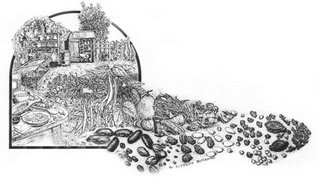We live in an age where our nourishment can be measured by its food miles. Did you know that on average every calorie of food uses 10 calories of oil to produce and bring it to your table. Based on a considerable amount of research, I suggest that this is not sustainable. To put it simply, there will come a day when we will, out of necessity, see a substantial growth in locally produced organic food.
"While the use of oil dominates the production end of the food system, electricity (usually produced from coal or gas) dominates the consumption end. The oil-intensive modern food system that evolved when oil was cheap will not survive as it is now structured with higher energy prices. Among the principal adjustments will be more local food production..." - Lester R. Brown, Plan B 2.0: Rescuing a Planet Under Stress and a Civilization in Trouble
Does this mean we will be forced to live on local potatoes and puha, and won't have all those refined and processed industrial foods that we have come to enjoy so much? Perhaps there is a middle road between these extremes. We are a creative species, and will probably find all manner of ways of using the resources we have to provide a diverse, interesting, and healthy diet.
Here on Waiheke we are off to a good start. There are lots of individuals, and several groups, who have this future clearly in their sights. These people are actively supporting the locally grown food option. The Waiheke Seedsavers group has been meeting for seven years and has a small but diverse bank of heritage variety seeds - those from plants that have developed, evolved and proven to do well in our local soil and climate. Then there is the more recently established Community Garden and the Food Exchange stall at the Ostend market. The Food Exchange stall is based on the observation that there is an abundance of food which, if not shared with others, will go to waste because it tends to come on suddenly and for a short season. So people bring their excess, and exchange it with others.

This Saturday (Dec 2nd) from 1:00 to 5:30pm, there is a workshop being held, on suburban permaculture. If you have sensed that growing some of your own food might be a good idea, but you don't know where to start, this workshop is for you. Robina McCurdy and her partner are coming up from Golden Bay to do some work with another group of people Publishon the island and they have kindly made their time available for this. They are highly qualified but their approach is very accessible. You will learn how to use the principles of permaculture and apply them to small suburban lots. The afternoon will include slides (lots of examples to get your imagination going) and time looking at Steve and Sophia's home on Ridge Rd. You will get to exercise the planning process, so when you get home you can dive into your garden with some greater confidence. For more information on the workshop, call James on 372 8737 or Steve and Sophia on 372 6640.
No comments:
Post a Comment